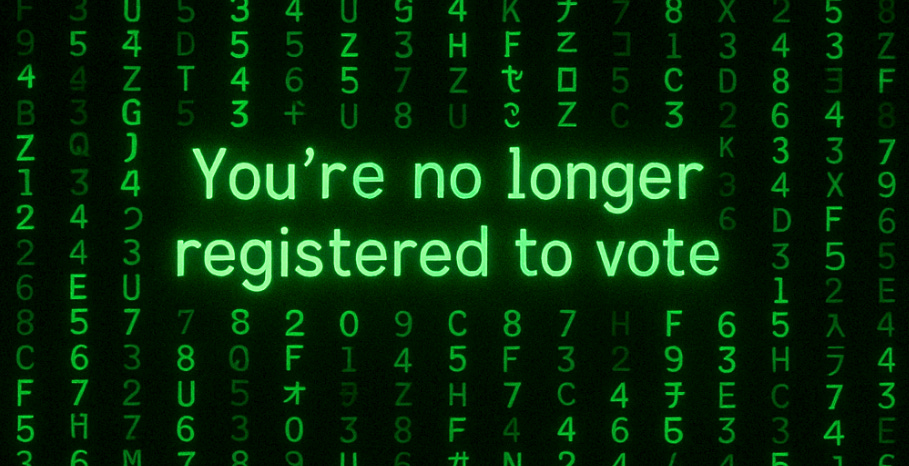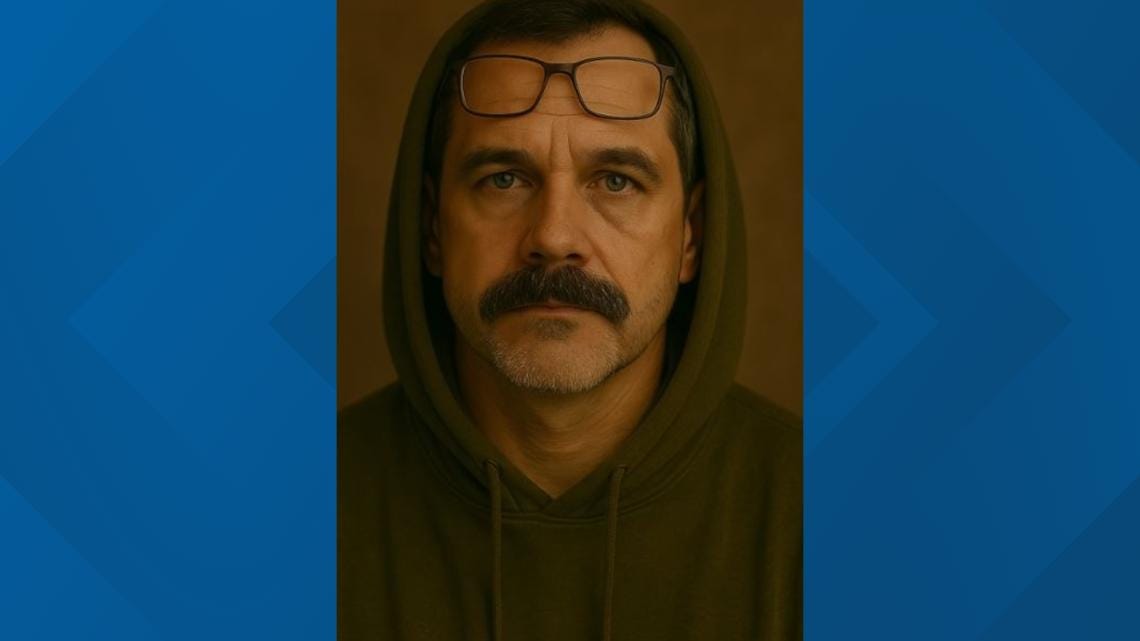Are you sure you're registered to vote?
200,000 glitches in the matrix ... Show us your war chests ... Or, don't.
Are you on the list of 30,000 Pima County voters who will have to prove to elections officials that they're American citizens or have their voting rights restricted?
Charlene Pesquiera has served as an elected judge in Pima County for the last eight years, and before that, she was a state senator. She has voted in Arizona elections for decades without an issue.
She’s on the list, she recently discovered.
Joe has voted in basically every Arizona election since 1993. Halfway through writing this story, he reached out to the Pima County Recorder's Office and found out he's on the list, too.
How’d they get on this undesirable list of up to 200,000 Arizonans who now have to prove that they're citizens?
It all started in the 1990s, when a software bug in the state’s Motor Vehicle Division voter registration system allowed people to register to vote without technically proving they were citizens.
That's because licenses issued before 1996 don't count as proof of citizenship, but when the state updated its MVD database in 2000, it classified anyone with a license issued before 1996 as having provided proof of citizenship anyway.
Any subsequent renewals, change of addresses or replacing a lost driver’s license for this group did not trigger the proof of citizenship requirement.
When election officials discovered the "glitch" last year, they asked the courts to help them decide what to do. And now county recorders are tasked with notifying roughly 200,000 Arizonans that they need to show a birth certificate or other proof of citizenship to vote in state elections.
In February, the Arizona Secretary of State's Office told recorders to send letters to notify them so they have an opportunity to provide proof of citizenship.
The Pima County Recorder's Office posted a notice on its website two weeks ago, but it largely went unnoticed. A representative for the office said it has started sending letters and the remaining letters will be sent to affected registered voters in the next two weeks.
Pesquiera has gotten her letter and showed proof of her citizenship at the Recorder’s Office. She worries whether other voters will have the same wherewithal to do the same.
"This process has been disconcerting where my citizenship is being questioned and my right to vote threatened. Hopefully, people will not be discouraged by these hurdles," she told us.
We asked the Pima County recorder for an interview, but she was unavailable for comment.
Voters concerned about their registration can call the Recorder’s Office at (520) 724-4330 to determine whether they will receive a letter.
Residents affected by the glitch have the option of mailing a copy of their birth certificate or their passport to the Recorder’s Office or coming to their office to update their records in person.
We wish we could fix this stress-inducing registration snafu for you, but we’re just humble reporters. What we can do is keep you informed so you know how to fix it, and who to hold responsible.
Now that the deadline to turn in signatures to qualify for the ballot in the Tucson City Council races is behind us, we’re turning our attention to campaign finance reports.
The deadline for the March post-election report was on Tuesday, and so far, only a handful of candidates have amassed sizable war chests.
Spoiler alert: they are not raking in millions like Congressional candidates.
Unless noted otherwise, all the candidates below are running as Democrats.
Most of the contributions collected would allow them to tap into the city’s matching funds program (we’ll dig into that topic on another day). So far, only one candidate has received funding from the program.
In Ward 3:
Councilman Kevin Dahl, who is seeking another term, raised $8,426 in the last fundraising cycle, but not including $20,733 in the bank left over from his previous campaign.
Sadie Shaw reported $2,367 in contributions. That includes a $765 loan to her campaign and a $1,000 donation from the Leadership for Educational Equity PAC.
Republican Janet Wittenbraker filed a report, but did not report any donations.
In Ward 5:
Jesse Lugo raised $18,025, which includes a $1,600 donation he made to his campaign.
Selina Barajas raised $14,375 from individuals. She also received $1,000 from United Food and Commercial Workers International Union Local 99.
Fabian Danobeytia raised $889 for his campaign, including a $355 donation he gave to his campaign.
Chris Elsner has raised $4,043 so far for his campaign.
In Ward 6:
Miranda Schubert raised $19,431 and received an additional $16,459 from the city's matching fund program.
Leighton Rockafellow raised $26,445, including a $300 donation he made to his campaign.
Theresa Riel raised $3,050, including $210 she gave to her campaign.
James Sinex, who has not filed a report since March, reported a single donation of $324 — which he gave to his campaign.
Republican Jay Tolkoff reported raising $100.
Every day, we scour more than 100 news sources looking for the articles you need to see in our In Other News section.
It’s a lot of work! And a lot of interesting stories get saved for our new weekly policy newsletters, the Water Agenda, Education Agenda and A.I. Agenda.
So today, we thought we’d show you a little of what you’re missing if you haven’t subscribed.
Here’s a sample of the Other News in education, water, and artificial intelligence.
Want the weekly scoop delivered straight to your inbox? There’s a button for that.
In Water Agenda Other News
Not having it: Gov. Katie Hobbs has vetoed seven water-related bills that she said provided “political cover” for the Legislature, KJZZ’s Camryn Sanchez reports. All of the bills were sponsored by Rep. Gail Griffin, a Republican from Cochise County who has long held the keys to Arizona’s water legislation. Hobbs said the bills made “pointless trivial statutory changes,” when Arizonans want actual groundwater management.
Long time coming: After 25 years, a contaminated aquifer in central Phoenix was finally cleaned up last week, KTAR’s Balin Overstolz McNair reports. The aquifer, which is located in an industrial area, was contaminated by tetrachloroethene (PCE), a chemical often used in the dry-cleaning business. Back in 2016, state officials started putting microbes and sucrose into the ground, which began the process of breaking down the harmful chemicals. Arizona’s Department of Environmental Quality has another 37 sites scheduled for decontamination efforts.
In Education Agenda Other News
Trans policy backlash: Governing board members at Mesa Public Schools got an earful when they proposed a “gender dysphoria policy,” the Mesa Tribune’s Cecilia Chan reports. The policy would require school staff to notify parents if their kids ask to go by a pronoun or name that’s different from the one on their birth certificate, as well as force them to use bathrooms and play on teams that align with their sex at birth. Most of the 80 people who spoke at the board meeting last week criticized the proposal, saying it would make students feel “unsafe, unwelcome and unsupported.”
Trying to pay the bills: Local school districts are struggling to make ends meet. The Deer Valley Unified School District is asking the Legislature to help cover the ever-higher electricity costs for air conditioning at schools. The Scottsdale Unified School District is facing a shortage of bus drivers. And the Chandler Unified School District is reeling from a failed bond election last year that officials hoped would pay for renovations at two elementary schools.
In A.I. Agenda Other News
AI’s doing police sketches now: Goodyear police just used AI to generate a forensic sketch of a suspect in an attempted kidnapping case, 12News’ Gabriella Bachara reports. Police took a hand-drawn sketch and fed it into ChatGPT, which spit out an image that was so realistic “it made my jaw drop,” sketch artist and Goodyear Police Office Michael Bonasera said. He isn’t worried about AI taking his job; it’s actually going to help police dig into more cold cases and generate new leads, he said.
For those about to rock: The French streaming platform Deezer said 18% of uploaded songs are fully generated by AI, Reuters reported. An executive at Deezer, which has nearly 10 million subscribers, said “we see no sign of it slowing down.” They launched a detection tool in January to filter out AI-generated songs, as artists increasingly are filing lawsuits accusing AI firms of stealing their copyrighted material.
All we can do is laugh/cry at the absurd, arbitrary campaign finance deadlines for the special election in Congressional District 7, and the way candidates juke requirements.
The “pre-primary” report — which covers all the donations between April 1 and June 25 — is due on July 3.
That's more than two weeks after voters get their ballots in the primary election.
So unless you hold onto that ballot for a while, you'll have no idea who's funding the candidates.
And the candidates themselves are partly to blame for that.
Of the five Democrats running to replace Raúl Grijalva in Congress, only Daniel Hernandez filed a campaign finance report. That's because he's the only one who started collecting donations before the Federal Election Commission’s reporting deadline of March 31.
Yes, some of the other candidates announced their campaigns before the deadline. But they didn’t start taking donations until April 1.








